It’s hard to believe that just 3 months ago, rebels were beginning the biggest and most disruptive protest Cambridge has seen since Reclaim the Streets in 1996.
In the midst of lockdown and with our capacity to take direct action limited, we wanted to take a look back at the biggest of many amazing actions Extinction Rebellion has carried out in Cambridge.
In the first campaign which saw XR Cambridge receive international media attention, we do this through the lens of the press coverage – good and bad – that we received throughout the week.
What was Rebel for Justice?
Rebel for Justice was a week-long roadblock which aimed to put pressure on three major institutions in Cambridge to meet three essential demands which connected action on the climate emergency with social justice in our region.
These local demands were:
- The University of Cambridge must cut its ties to the fossil fuel industry.
- Cambridge City Council must hold a Citizens’ Assembly on Climate Justice.
- Cambridgeshire County Council must work with other relevant regional authorities to provide a plan for a just transition away from an inadequate transport system reliant on fossil fuels.
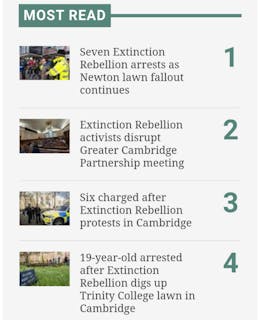
The campaign was developed by XR Youth Cambridge, supported by XR Cambridge, and announced in January this year. The three local demands were posed to the institutions with the ultimatum that, if they were not met in full, XR Youth Cambridge and XR Cambridge would create a blockade on a major road within the city. This would cause a week of disruption and act as the base for direct actions targeting the institutions.
The campaign was preceded by a number of high-profile pressure-building actions – including the occupation of the City Council Chamber during full council, which made headlines thanks to the spectacle of one brave rebel abseiling into the chamber from the public gallery. However, the City Council, County Council and University refused to act, and so on 16th February – a day of March winds arriving a month early – rebels stepped into the road and took the roundabout at the intersection of Trumpington Road and Fen Causeway. This became their home for the week.
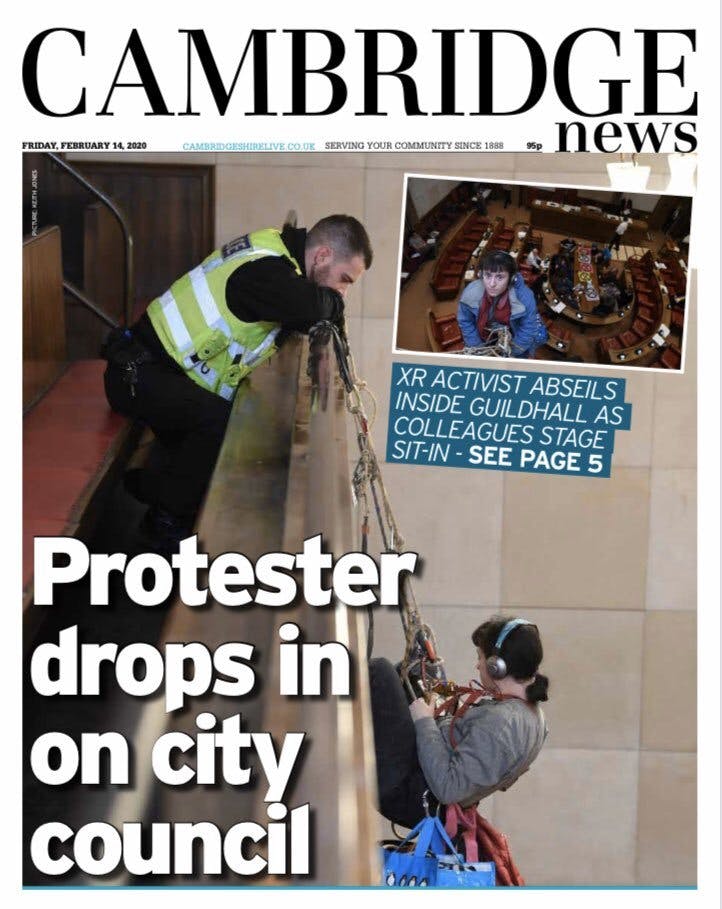
What were the daily themes?
Each week-day had a theme:
- Sunday – Taking the site.
- Monday – Whose Earth? Focusing on land exploitation.
- Tuesday – Fossil Fools: Ending Cambridge University’s ties with the fossil fuel industry.
- Wednesday – The Road to Climate Catastrophe: Tackling Cambridgeshire’s poorly planned, expensive public transport.
- Thursday – Another World is Possible: Coinciding with the International Day of Social Justice.
- Friday – Dear World… Yours, Cambridge: Cambridge’s international responsibility as a global city.
- Saturday and Sunday – Tackling climate breakdown.
The daily themes were summarised here in the Cambridge News.
Sunday 16th – Enter XR
At 9.30am, the Cambridge Independent announced that Extinction Rebellion had “begun its week-long, round-the-clock roadblock in Cambridge city centre”. They described how the action “being led by the group’s youth wing, XR Cambridge Youth, and represents the start of its Rebel for Justice protest”. Cambridgeshire police used emergency powers to close a section of Trumpington Road and Fen Causeway, putting in diversions for vehicles and buses.
Cambridge Independent’s summary of the day.
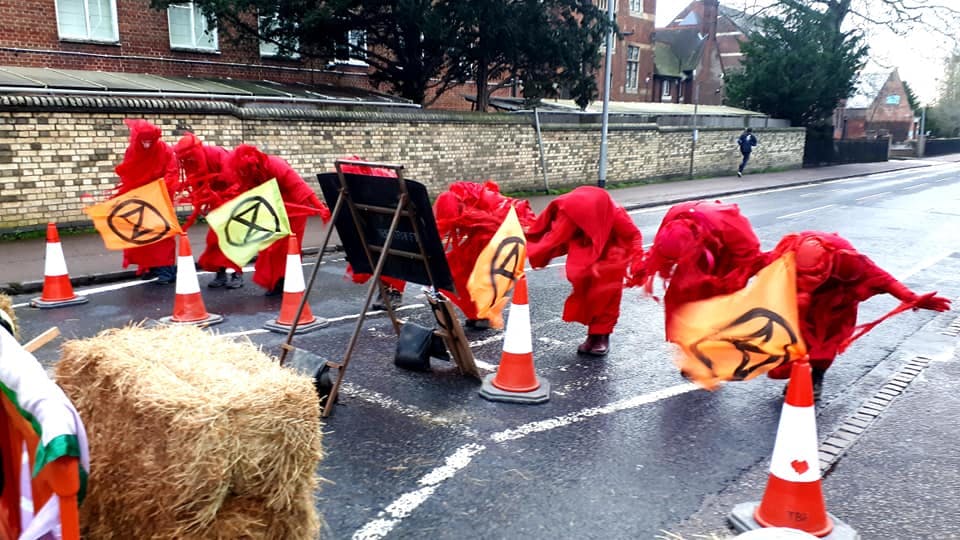
Monday 17th – Lawngate: The controversy kicks off
The real controversy began on Monday when rebels dug up the lawn outside Trinity College to highlight the college’s attempt to build a business park on land it owns at Innocence Farm in Suffolk. We also drew attention to the College’s investments in fossil fuels.
The act of digging up a lawn starkly divided opinion in Cambridge – tying in with XR’s strategy of polarising the public to recruit activists and also stir up emotion to provoke a visceral response to the environmental crisis. For the first time ever, XR Cambridge attracted national media attention from The Telegraph, the Financial Times… and even The Conservative Woman for this action. We even grabbed international headlines with the likes of the Hindustan Times. It just goes to show how drastic action really does get you up the news agenda!
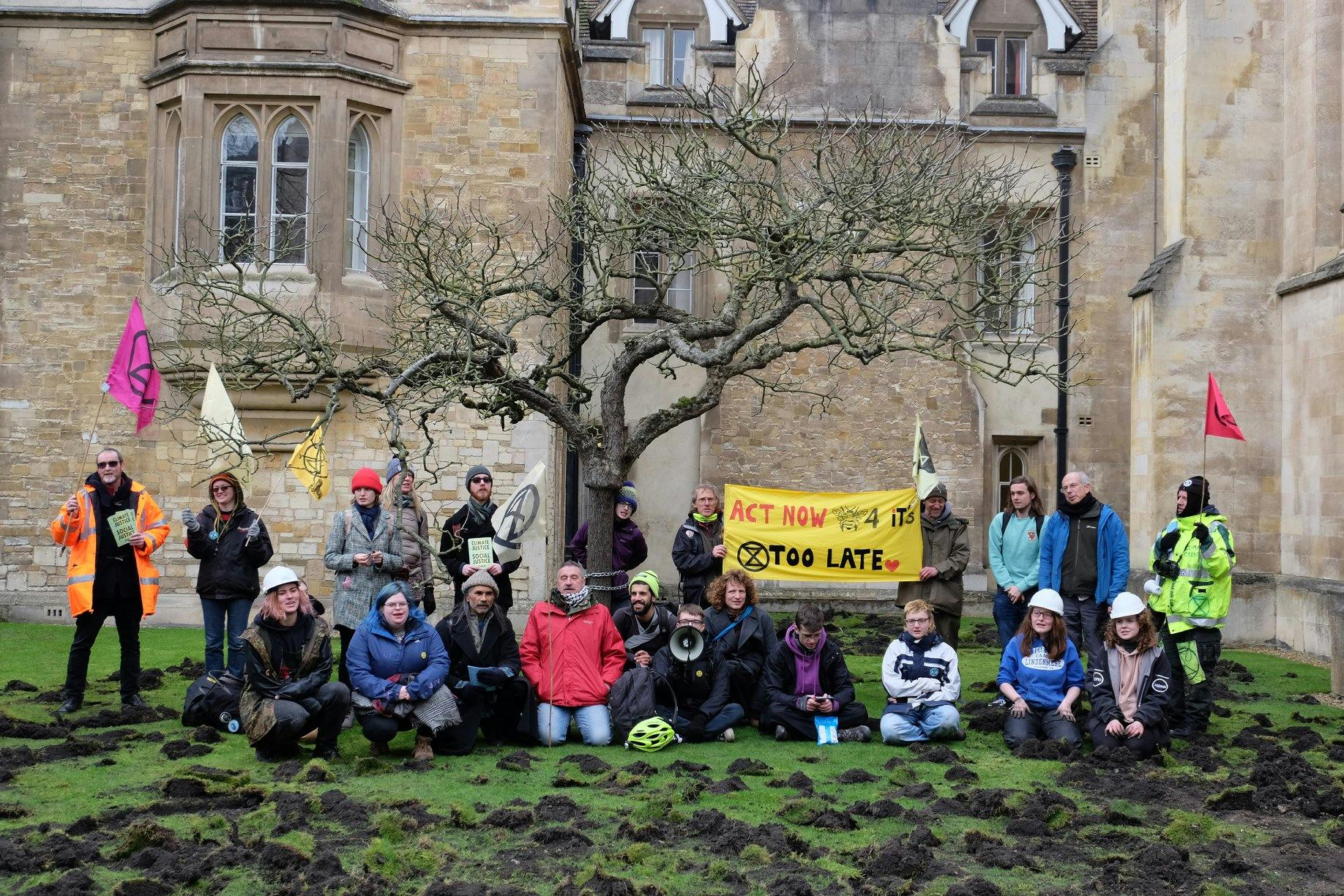
Trinity College condemned the action – despite hosting an event celebrating historic acts of criminal damage by women’s rights activists – showing the differing ways protesters are portrayed before and after the fact. Rebel Nathan Williams writes on the hypocrisy of Trinity’s response here, while Linda Richardson reflects on how we might need to look beyond our immediate reactions.
After digging up Trinity lawn, rebels took the earth to Barclays on St Andrews Street and literally turned it into a dirty bank. Barclays provided $85 bn of finance to the fossil fuel industry between 2015 and 2018.
Tuesday 18th – Schlumber party
The theme for Tuesday was “Fossil Fools” and the main target was fossil-fuel services company Schlumberger. Schlumberger, a little-known oilfield services company based on the West Cambridge site, was a target during the pressure-building actions leading up to Rebel for Justice. As oil and gas becomes more scarce, the company researches new ways for companies to squeeze every last drop of fossil fuel out of the ground.
Cambridge University provides a “Schlumberger Cambridge International Scholarship” which offers training and resources for the fossil fuel industry, as well as the University maintaining a “Schlumberger Professorship of Complex Physical Systems”.
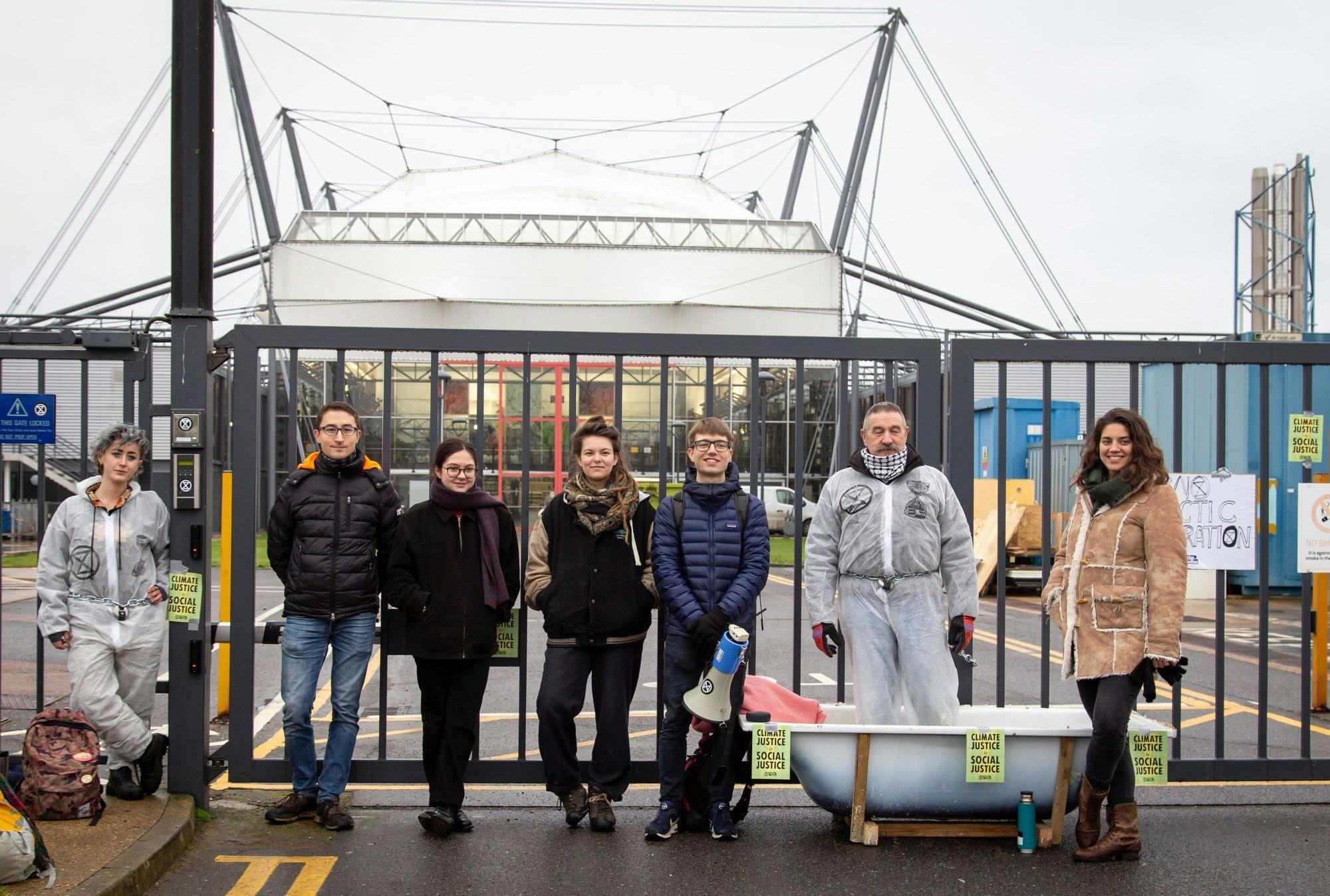
Rebels glued on to the building – as well as two police vans – and created a huge media spectacle to draw attention to Schlumberger’s activities in Cambridge, which have gone under the radar for so long, as well as the University’s ties to the company. Cambridge News made this photo gallery.
The day also saw fallout from Monday’s Trinity lawn action, with three rebels being arrested – for digging up a lawn! – as well as a further four at Schlumberger.
Wednesday 19th – Driving home the point
Midweek, and attention turned to transport justice. Rebels disrupted the Greater Cambridge Partnership (GCP) board meeting with drumming and off-agenda questions, leading to the meeting’s temporary suspension. The GCP is responsible for the development of the transport network over the coming years, but so far has sat on £100M with virtually no new green infrastructure to be seen.
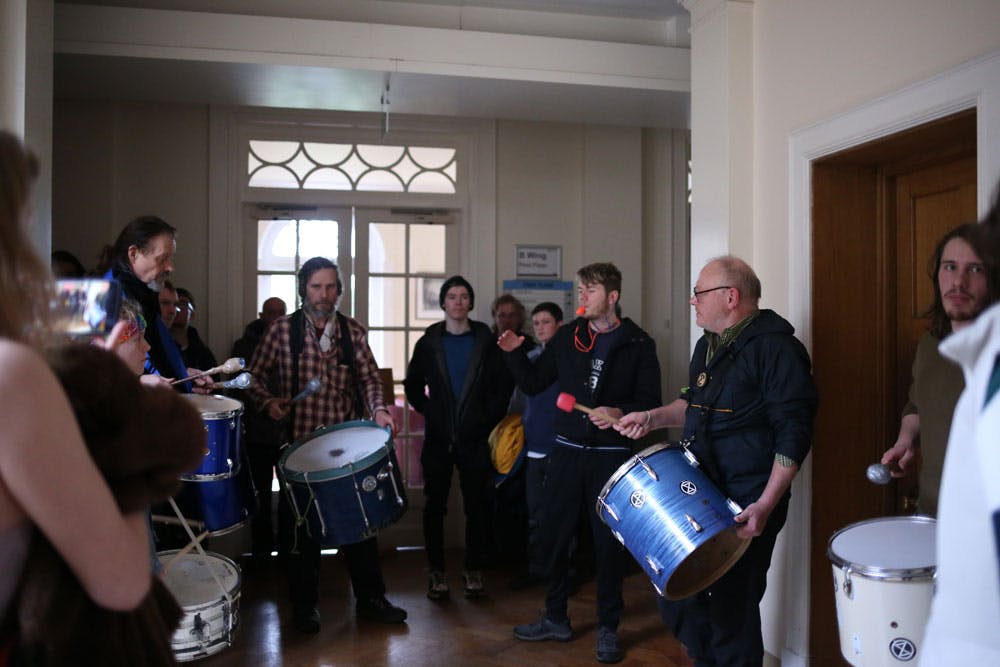
A disabled member of XR was prevented from accessing the public meeting in her wheelchair. The activist, Nicki Myers, attended a People’s Assembly by GCP late last year. She said of the workshop: “Participants were told not to focus on the climate – [advice] we largely ignored.” On the theme of social justice, we pointed out that residents north of Cambridge are totally excluded from the GCP and that those living in the rural communities are forced to pay huge fares for bus services that run irregularly, infrequently and often stop before the end of the working day.
Here is Cambridge Independent’s coverage of the action and the rolling updates from Cambridge News.
Thursday 20th – Climate justice is social justice
On the International Day of Social Justice, rebels headed to the vast new luxury development at Eddington. There, rebels protested the construction of high-end housing which is both unaffordable to most people and also hugely damaging to nature, as well as unsustainable in an area of severe water depletion such as the East of England.
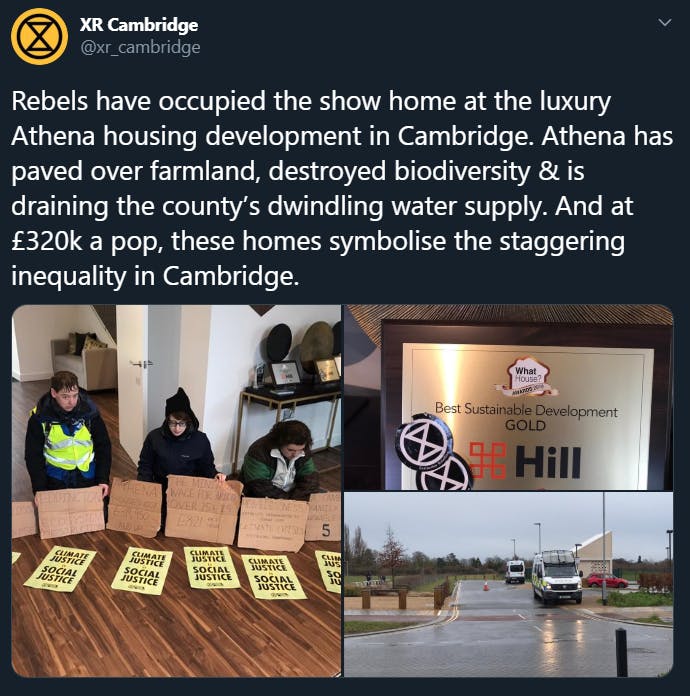
Hill’s luxury houses, built on the site in collaboration with Cambridge University, are priced from £319,950, against a backdrop of a national minimum wage of £8.21 per hour. And while Hill claims their houses are sustainable, they are being constructed at a time when the Environment Agency tells us that the River Cam is flowing at its lowest level since records began. We argued that while homes are needed, they must be ultra-sustainable and for those who really need them, not the super-wealthy.
Friday 21st: Dear World… Yours, Cambridge
As the working week came to a close, we prepared to go out with a bang! Rebels marched from the roadblock site to the Newnham Shell Garage, a familiar protest site, where protestors scaled the canopy over the forecourt.
Fossil fuel companies like Shell are destroying land and communities across the world as they extract every last drop of oil from the ground, and pumping. This destruction continues as they pretend that by buying their project, consumers can drive carbon neutral through their offsetting land.
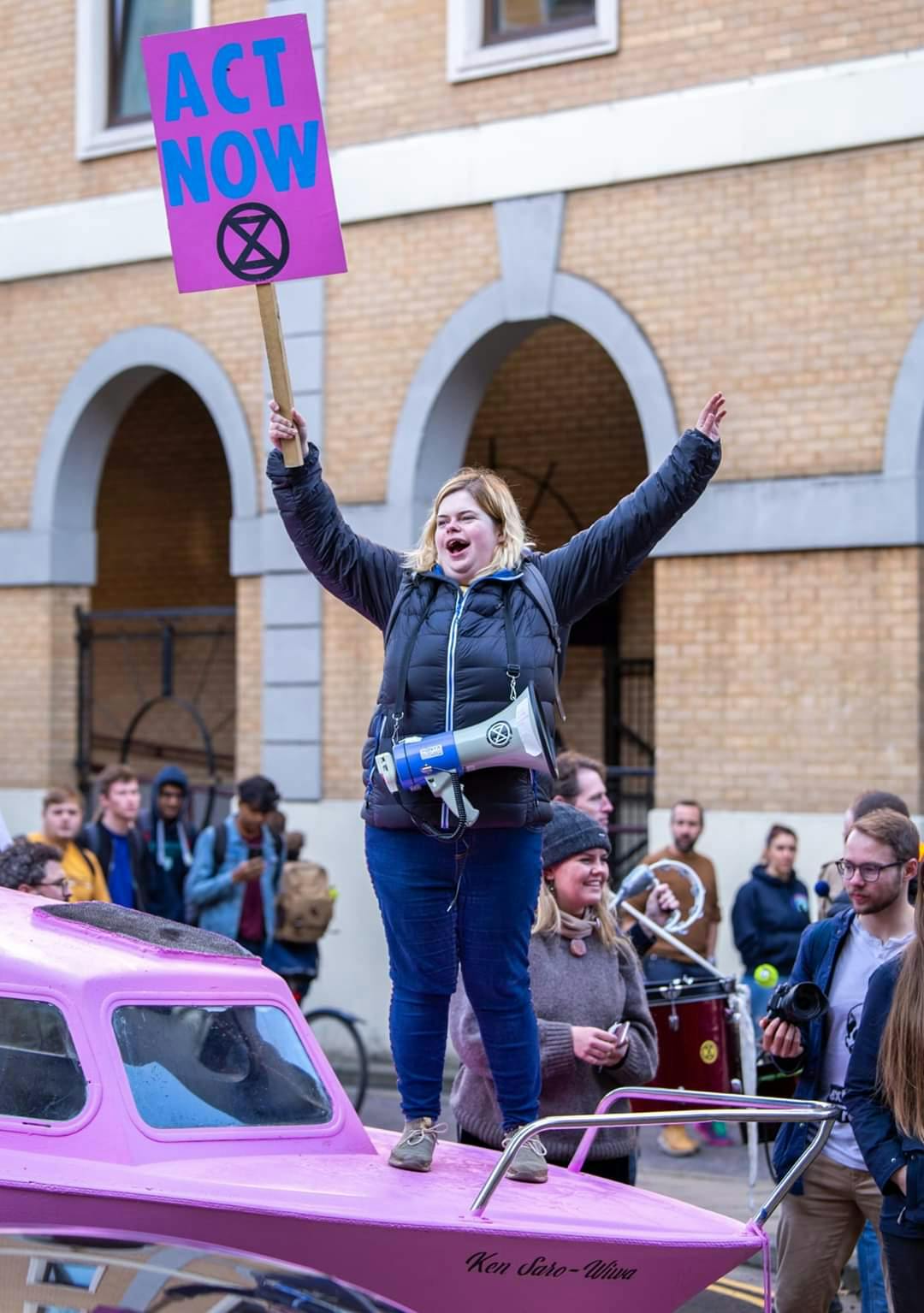
Through a memorable, vertigo-inducing protest, rebels drew attention to their cynical scheme and highlighted Shell’s collusion in the murder of activists who stand up to them, such as Ken Saro-Wiwa – who XR Cambridge’s pink boat (pictured below with a rebel aboard) is named after.
Other developments included a return to Trinity College for a rebuttal of their hypocritical response to the lawn action, while rebels also joined in solidarity with the UCU strikers for a joint rally outside Senate House.
Saturday 22nd – Making new friends…
As rebels prepared to wind down the protest, we were paid a visit by a group of “anti-XR” demonstrators. Whisperings of the counter-demo had been going round all week but the counter-demo turned out to be something of a damp squib. The demonstrators stood on the far side of the road and a few rebels went over for a friendly chat.
Rebel for Justice had been dividing opinion all week and had attracted strong reactions from many, with a petition doing the rounds calling for the police to break up the demonstration. Recognising that the petition was provoking discussion of the cause we are highlighting, we decided to promote it on our Twitter account!
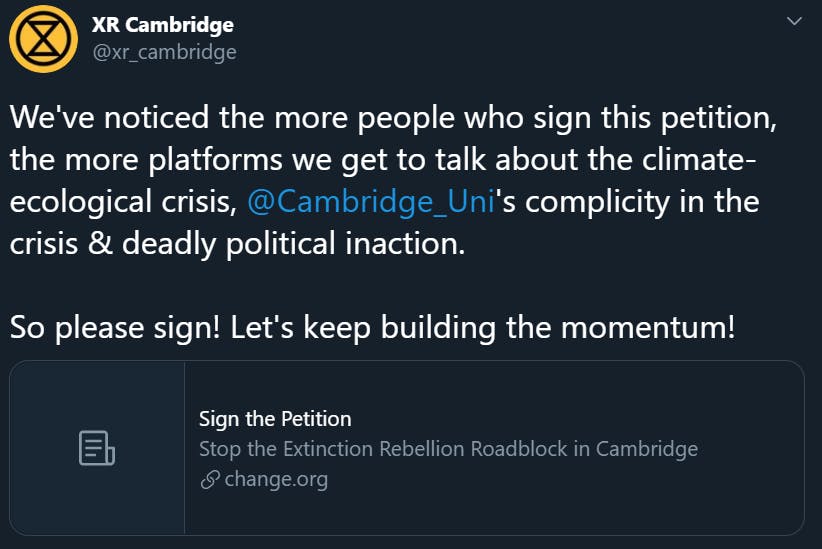
Although the strong reaction helped get the climate emergency into the public sphere, we were also pleased to receive supportive words and gratitude from a victim of the Lancashire floods. Local residents also thanked us for the quiet we brought to the area, saying it was the first time in a long while that they had been able to hear bird song.
Sunday 23rd – End of an era
After a week of hard work, it certainly felt like it. Mike Scialom wrote a poetic and rather moving account of the closing march for the Cambridge Independent, focusing on the Red Rebels.
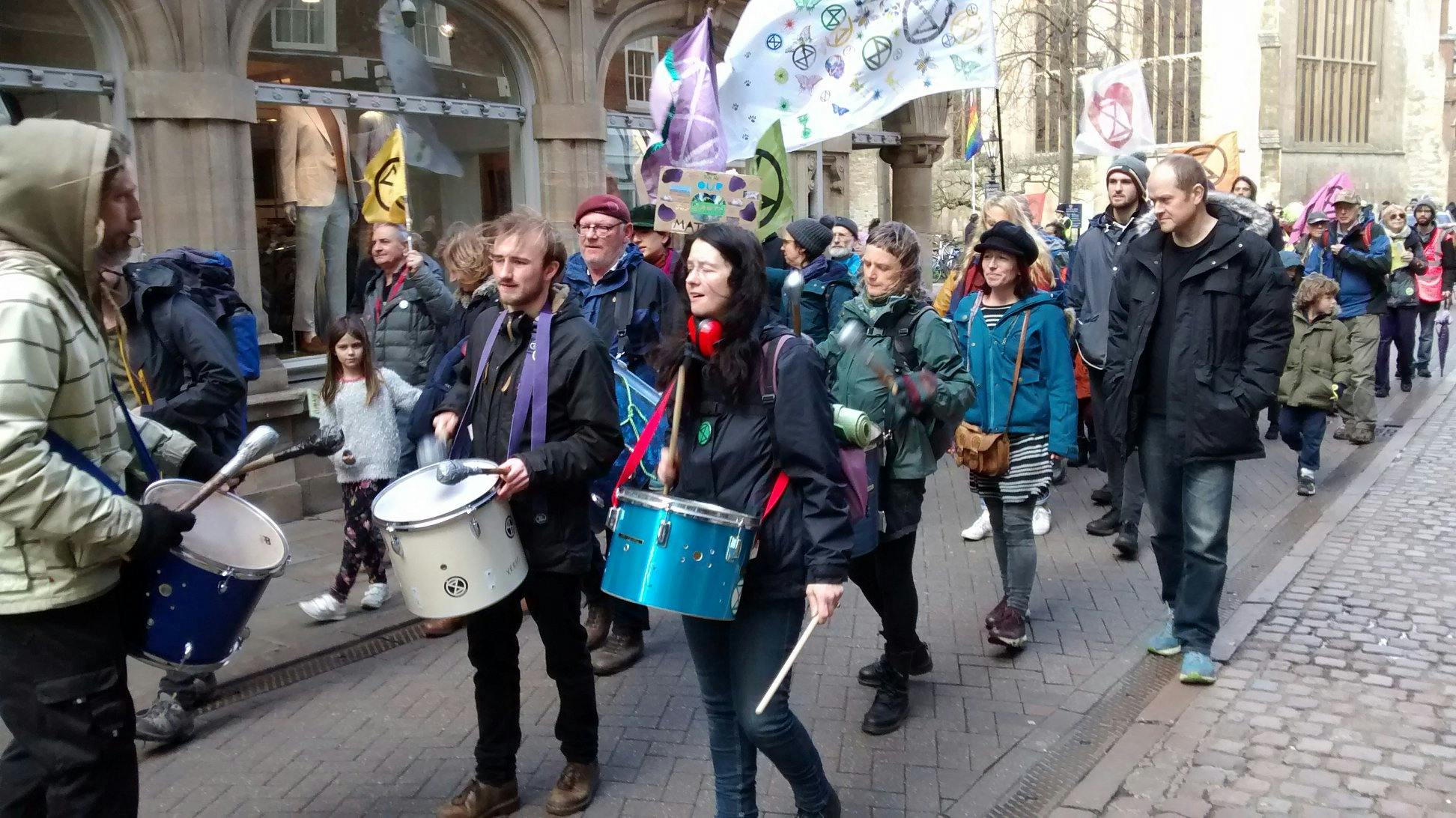
Despite their tabloid-y headlines throughout the week, to their credit, Cambridge News did publish these fantastic photo galleries:
So what next?
The coronavirus crisis has pushed large-scale on-street rebellion off the agenda for the time being. Rebels have been getting involved with their mutual aid groups, and you can see a picture summary of the ways they have been helping here. XR across the country has focused on #NoGoingBack campaigns, demanding that we use this historic opportunity to transition to a green economy which supports everyone.
But when we have come through the worst intensity of the Covid-19 crisis, XR Cambridge will return to the demands of the Rebel for Justice campaign – because despite all the warm words, all the excuses and all the accusations levelled at XR, none of the institutions we targeted has taken any steps towards meeting the demands we raised. This is not a fight we can give up on.
Images credits: Sophi Berridge, Tom Dorrington, Simon McKibben, Kay Goodridge, Talia Woodin, Ian Greenwood
